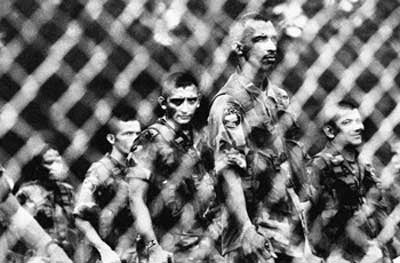The decision by Colombia’s Constitutional Court to strike down parts of a law governing demobilization of paramilitaries corrects major problems in that law, Human Rights Watch said today.
The court upheld the controversial Justice and Peace Law, which the Colombian government had pushed through the Congress last year. But it struck down some of the law’s most troubling provisions, and amended others to bring the law into line with constitutional and international standards on truth, justice and reparation.
“The Justice and Peace Law made a mockery of the basic principles of human rights and accountability,” said José Miguel Vivanco, Americas director at Human Rights Watch. “But the court’s changes mean that paramilitaries who benefit from the law must confess to their crimes and make real reparations to victims.”
The court held that demobilized paramilitaries could, under the Constitution, receive sentence reductions allowing them to serve between five and eight years for their crimes.
However, it made several important interpretative amendments to the Justice and Peace Law, including in the following areas:
- Confession: The law provided that paramilitaries who wish to receive radically reduced sentences must give a statement to the police, but it established no explicit obligation to tell the truth about their crimes. The court ruled that the provision implicitly requires that paramilitaries must fully disclose the truth about their crimes in order to benefit from the law.
- Penalties for hiding the truth: Under the law, paramilitaries had no incentive to disclose any crimes unknown to the authorities, because even if it was later discovered that they had failed to disclose a crime, the reduced sentences would not be affected. The court ruled that if it was later discovered that a paramilitary failed to disclose a crime, the paramilitary would have to be tried under ordinary criminal law for that crime, jeopardizing the original sentence reduction.
- Investigation periods: The law severely restricted the amount of time prosecutors had to investigate paramilitary crimes. The court amended the restrictions, giving investigators more time to establish and verify the truth about paramilitary crimes.
- No additional sentence reductions: The law provided that in calculating time served for the purpose of sentencing, judges could include the time paramilitaries had spent negotiating with the government in specially designated areas, so sentences could have been as low as 28 months. The court struck down this provision.
- Turnover of assets: The law provided that paramilitaries should turn over illegally acquired assets to provide reparation to their victims. The court ruled that paramilitaries must not only turn over all their illegally acquired assets (such as land taken by force), but could also be required to pay reparations from their legally acquired assets.
- Victim participation in criminal proceedings: The law restricted victims’ ability to participate in criminal proceedings against paramilitaries. The court ruled that victims may participate in all stages of the proceedings, as they could in any ordinary criminal case.
Human Rights Watch said that the most significant part of the court’s decision is the requirement that paramilitaries confess fully. “By forcing paramilitaries to tell the truth about their crimes, or risk losing their sentence reductions, the court has finally given the law some teeth,” said Vivanco.

Troops of the Catatumbo Block of the right-wing AUC (United Self-Defence
Forces of Colombia) paramilitary group, during a demobilization ceremony held in Norte de Santander province. © Private
Colombia’s paramilitary groups are on the U.S. Department of State’s list of foreign terrorist organizations. The U.S. government has requested the extradition of many top paramilitary commanders for drug trafficking. In 2002, a group of top commanders initiated demobilization negotiations with the Colombian government in the hope of avoiding extradition and lengthy U.S. prison terms.
Paramilitary commanders are responsible for numerous massacres, targeted killings, forced disappearances and acts of torture and extortion over the course of the last two decades. The troops they command are paid and financed through complex drug-trafficking operations and other illegal activities. Because of the groups’ enormous wealth, individual paramilitary members are easily replaced with new recruits, and paramilitary commanders enjoy political influence in much of the country.
Last year, the administration of President Alvaro Uribe pushed a law through Congress that would allow paramilitaries to receive dramatic sentence reductions in exchange for their demobilization. Human Rights Watch, along with the U.N. High Commissioner for Human Rights, the Inter-American Commission on Human Rights, and many local and international organizations, strongly opposed the law for being inconsistent with international standards on truth, justice and reparation, and because it was unlikely to further the dismantlement of paramilitaries’ powerful criminal networks.
Colombia’s Constitutional Court is the country’s highest court. In recent years, it has decided numerous landmark cases, including last year’s ruling that a law allowing Uribe to run for re-election was constitutional. In today’s ruling, the court was split 6-3, with three justices dissenting from the majority decision on the ground that the entire Justice and Peace Law should have been struck down.






